
What Does Bulking Do?
Bulking is when you gain weight to support muscle growth. Not everyone needs to gain weight to build muscle, but some people do. That’s because you need to do two things to build muscle:
- Stimulate muscle growth, usually with weight training.
- Give your muscles enough protein, calories, and time to recover and grow.
Any good muscle-building program combines those two things. What sets bulking apart is that the diet puts you into a calorie surplus—it causes weight gain.
There are many different ways to bulk, each with a slightly different purpose. If you want to build muscle as fast as possible, you can bulk aggressively. If you’re worried about gaining fat, you can bulk leanly. If you want to bulk in a healthy way, you could do a clean bulk. If you don’t care about any of that, you can do a dirty bulk.
Bulking has a controversial reputation, but I think that reputation is almost wholly undeserved. The criticism usually comes from people arguing against a specific style of bulking, then falsely applying that criticism to bulking in general. For example, someone might say that bulking will make you fat, forgetting that lean bulking exists. Or that bulking means overeating junk food, forgetting that clean bulking exists.
Let’s delve into some of that nuance.
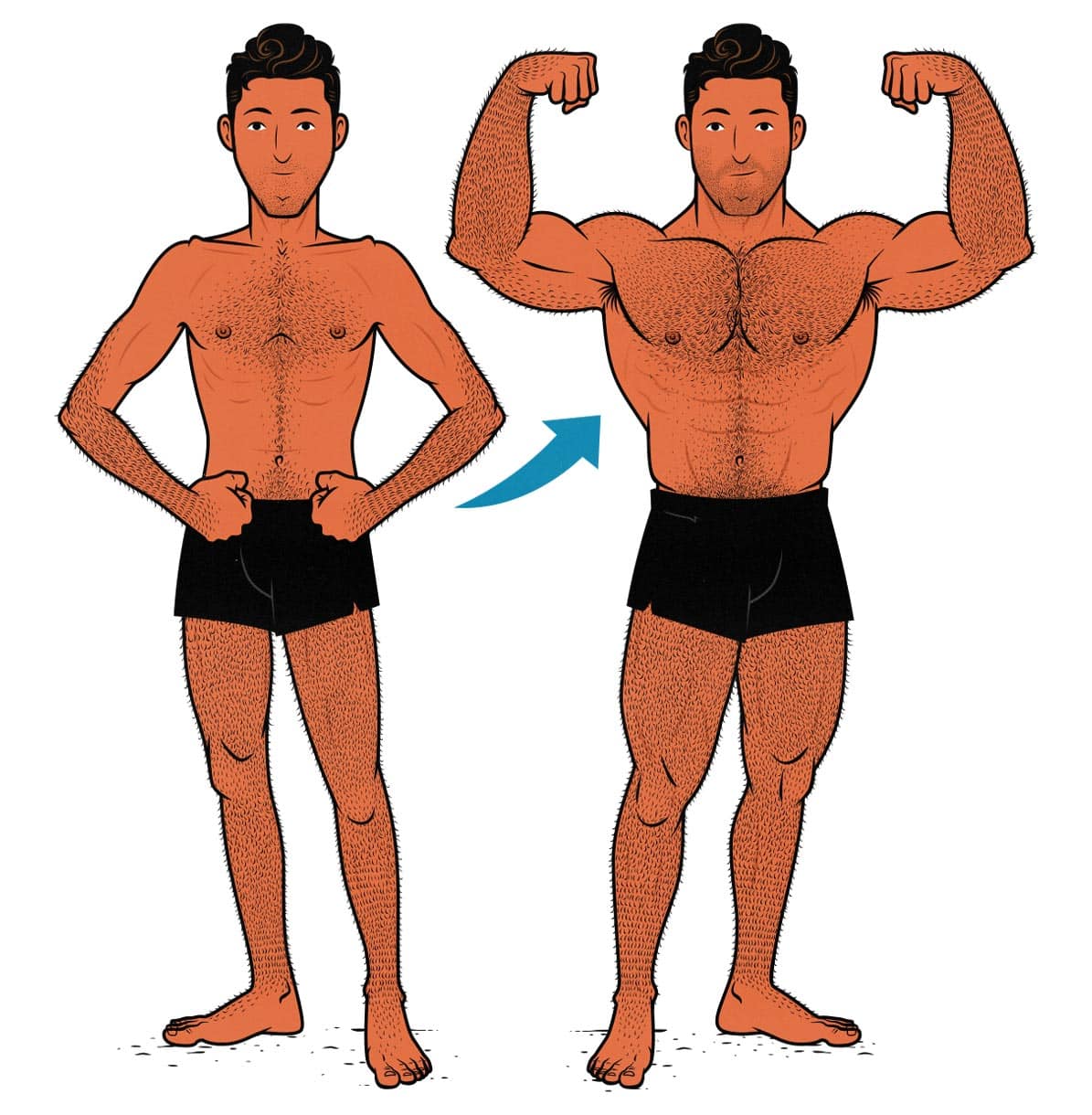
It Takes Energy to Build Muscle
It takes between 2,500 and 3,500 calories to build a pound of muscle or gain a pound of weight. That energy needs to come from your diet or your body fat. If it comes from your diet, you’ll gain weight (bulking). If it comes from your body fat, your weight will stay more stable (recomping). More on that in a moment.
Eating in a calorie surplus also gives you more energy, pumps more anabolic hormones through your system, and inflates your muscles full of glycogen, all of which speed up your rate of muscle growth. That’s why almost everyone will build muscle at least a little bit faster when bulking.
What’s Bulking For?
When you build more muscle, you have more contractile tissue that can help you lift heavier weights, run faster, and jump higher. That’s why so many athletes, from powerlifters to fighters to football players, go through bulking periods. It makes them bigger, stronger, tougher, and harder to stop.
Before we founded Bony to Beastly, Marco’s specialty was helping college, professional, and Olympic football and rugby players bulk up to improve their sports performance and reduce their risk of injury.

I know this is obvious, but if your goal weight is higher than your current weight, you need to gain weight to get there. You could do that by accident, gaining mostly fat, or you could do it on purpose, gaining mostly muscle. In my case, I bulked to go from 130 to 200 pounds (shown above).
Is Bulking the Best Way to Build Muscle?
Bulking isn’t a very good way to build muscle if you’re already overweight. You aren’t suffering from a lack of energy, so adding more won’t solve your problems. It’s better to burn your body fat for energy, using that to build muscle. That’s why cutting or recomping is better for most people.
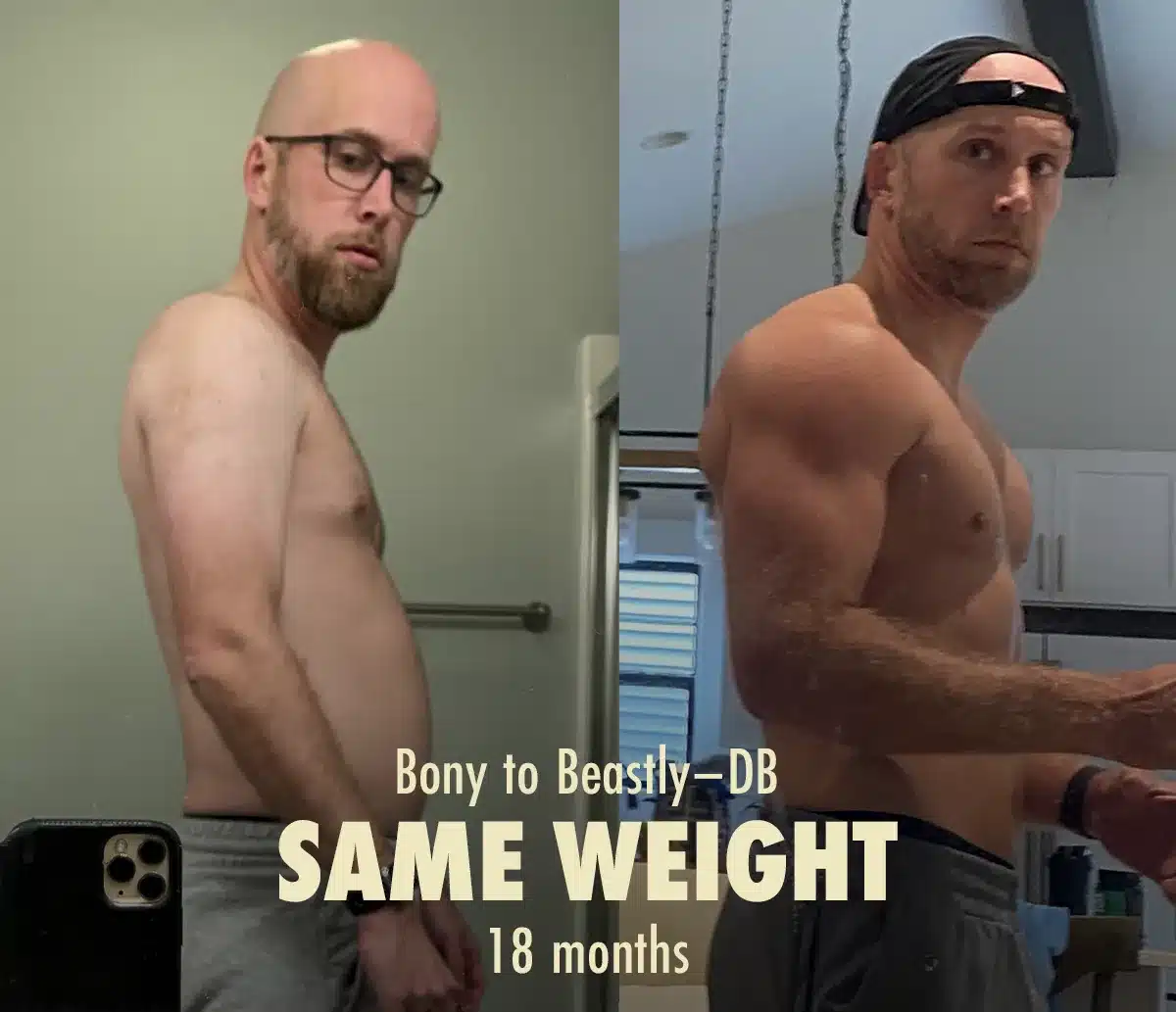
But some of us are skinny, thin, or lean. We have some fat, but we aren’t overflowing with it, so our bodies are reluctant to burn what little we have to build muscle. From your body’s perspective, that would be like draining your savings to buy a yacht. To build muscle, then, we need to get the extra energy from our diets. That’s what bulking does.
Skinny-fat people are somewhere in the middle. They could bulk, cut, or recomp. The best path forward depends on how skinny and fat you are, and whether you’re more excited to build muscle or get leaner.
So, bulking isn’t always the best way to build muscle, but for some people, it’s the only way.
Will Bulking Make You Fat?
When you bulk, the idea is to line up your rate of weight gain with your predicted rate of muscle growth. For example, if you think you can gain a pound of muscle per week, you’d eat enough food to gain a pound per week. If you do that perfectly, most or all of the weight you gain will be muscle.
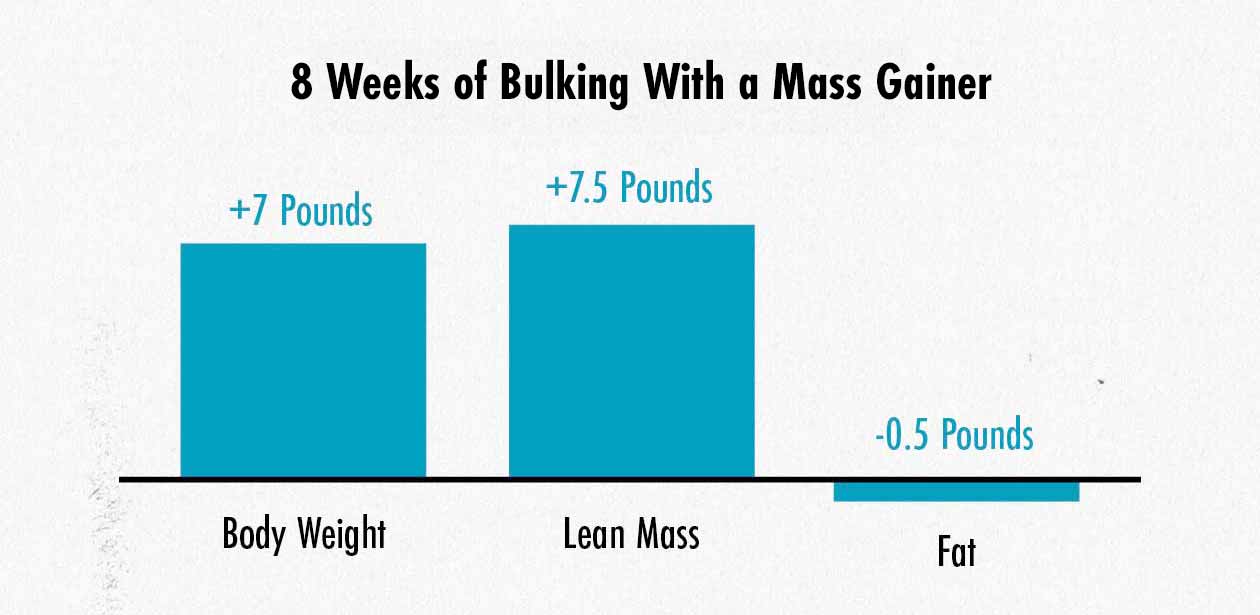
For example, in a study by Rozenek and colleagues, the participants gained 7 pounds in 8 weeks, yielding 7.5 pounds of muscle growth and 0.5 pounds of fat loss (study). However, keep in mind that these are the average results. Some guys gained faster, others slower. Some leaner, others less so.
We’ve looked at all the studies, spoken with the top researchers, and have over a decade of experience helping thousands of skinny people bulk up. We’ve also kept track of our client results, helping us do better in the future.

When we look at a new member’s photo, we can get a pretty good idea at how quickly they ought to bulk, but it’s still just an educated guess. It’s impossible to know exactly how quickly any one person can build muscle.
That means you need to lean in the direction of your priorities:
- If you’re afraid of gaining fat, bulk slower than you think you need to.
- If you want to build muscle as fast as possible, err on the side of bulking faster.
- If you want to follow the best evidence, bulk at a moderate pace.
We have a bulking calorie calculator that can give you a good idea of where to start.
After that, we track their progress and adjust accordingly. We have them weigh themselves at least once per week. If they’re gaining weight too quickly, we tell them to slow down. Every fifth week, we look at their progress photos and body measurements to see if they should bulk faster or slower.
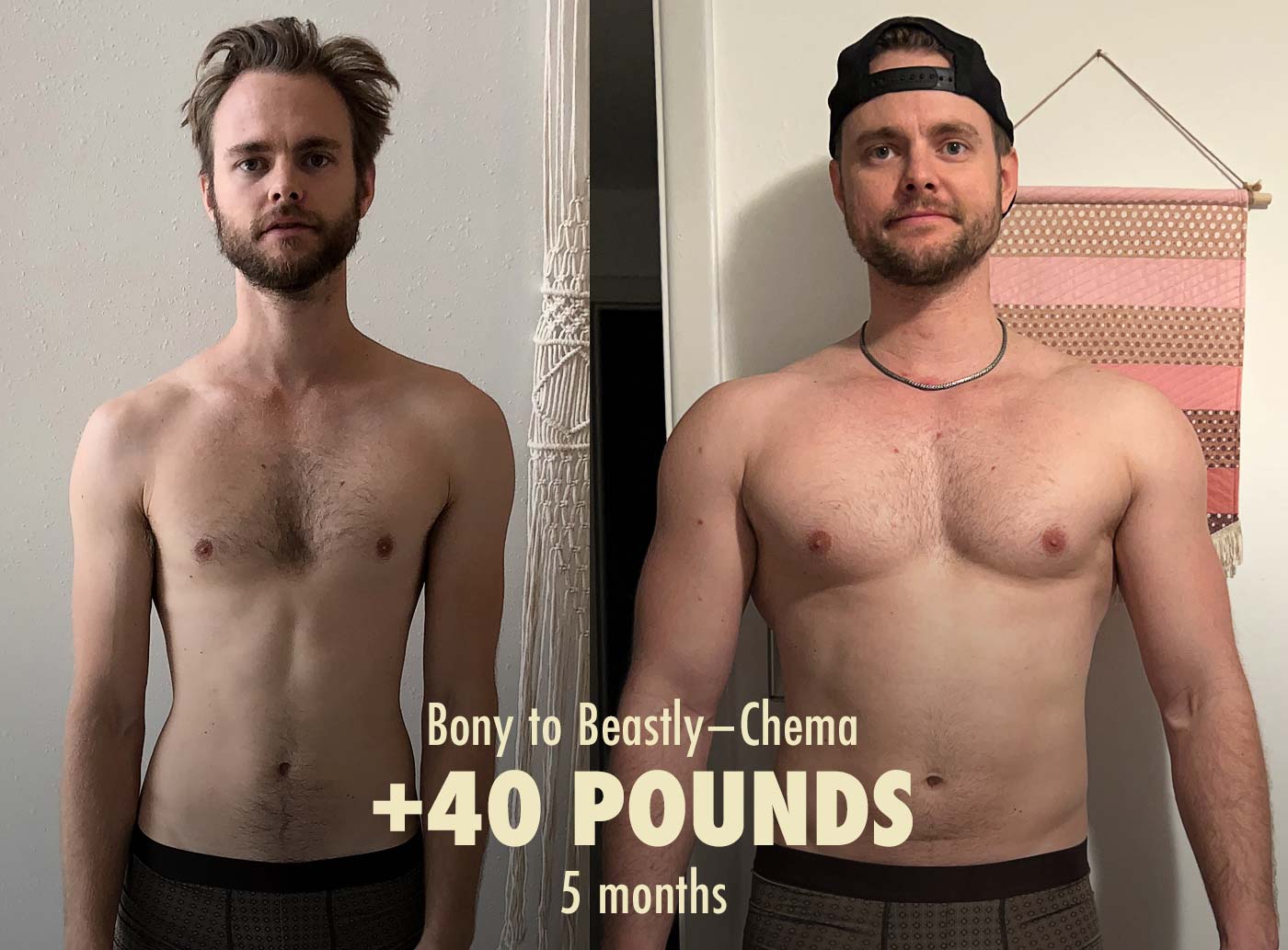
That means even if someone gains fat, they won’t ever get fat. You can adjust before that fat ever accumulates into a problem. Mind you, not everyone cares if they gain an extra 5–10 pounds of fat, as long as it comes with a proportional amount of muscle. Quite a few skinny people can burn off that fat fairly effortlessly, so there’s no need to stress about it, especially since it never gets to the point where it affects our health.
Is Bulking Unhealthy?
The next argument against bulking is that it has you eating tons of junk food. That can be true of dirty bulking, where you eat a “see-food” diet, consuming everything in sight. Some guys also go a bit wild with the mass gainer shakes. We don’t recommend that.
I don’t have any problem with you eating an abundance of calories, having a beer after work, or having dessert after dinner. There’s room in your diet for the things you enjoy. My nutritionist wife reminds me of that all the time. But the vast majority of your calories should come from nutritious foods. A good rule of thumb is to get at least 80% of your calories from nutritious foods.
This whole argument is a strawman, though. The average person eats a low-quality diet. The average bulker eats much better, intentionally trying to make good food choices. They might even track their macronutrients, ensuring their diet is balanced. Some people even track their micronutrients, making sure they get enough vitamins and minerals. (Macrofactor is good for that.)
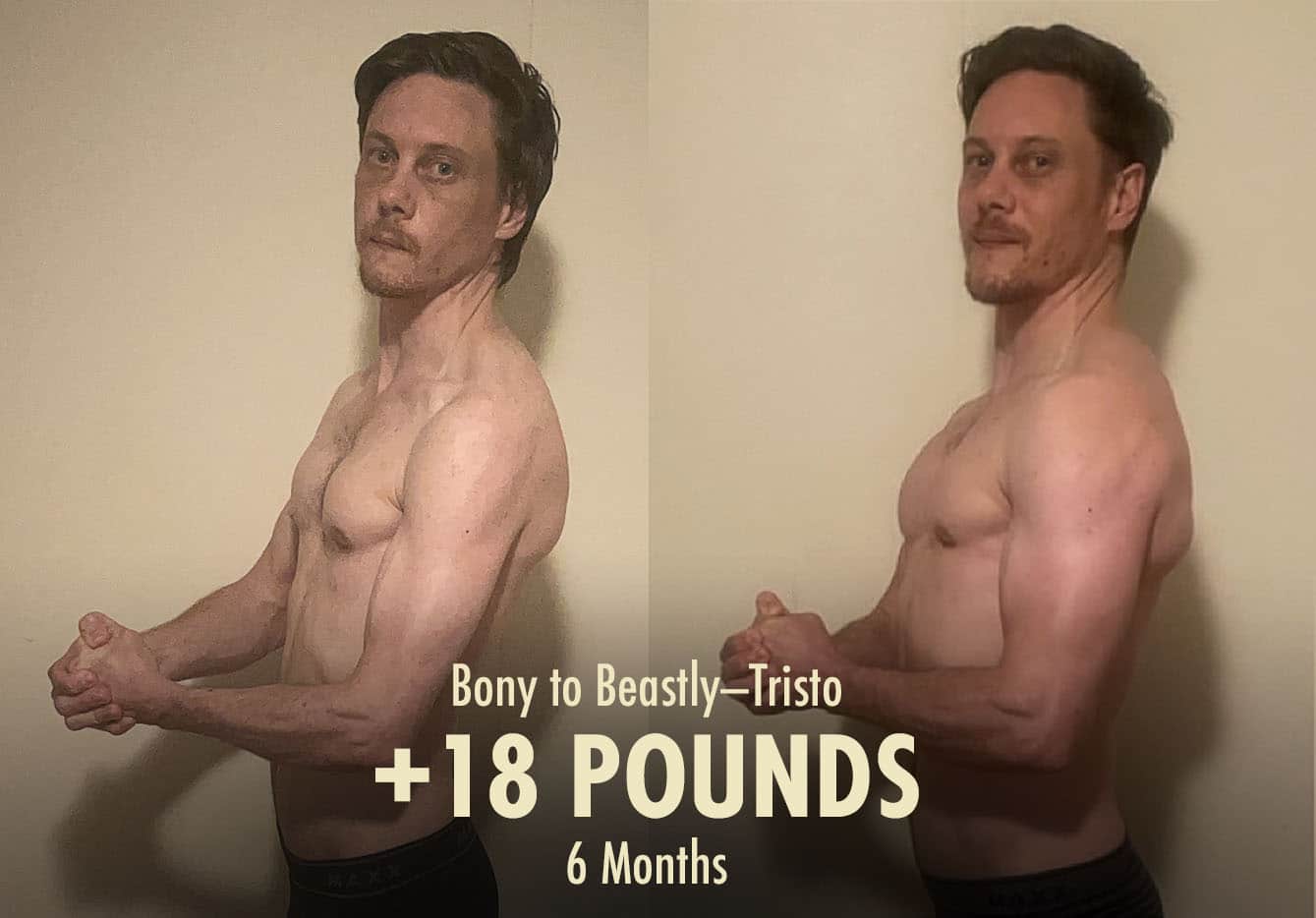
For more, we have a full article about eating a balanced bulking diet. The diet is rich in protein, carbs, healthy fats, fibre, vitamins, minerals, phytonutrients, and probiotics. It’s one of the healthiest ways to eat.
The only thing that sets it apart from the typical healthy diet is its higher calories. And because it’s higher in calories, you might need to choose foods that are easier to overeat. That’s especially true if you’re a skinny “hardgainer” with a fast metabolism. For example, you might eat more muesli, fruits, and smoothies. Blending fruits into smoothies won’t harm the nutrients.

Alright, that’s it for now. If you want us to walk you through the entire bulking process, check out our Bony to Beastly (men’s) program or Bony to Bombshell (women’s) program. They both include a 5-month customizable workout routine, a bulking diet plan, a recipe book, a lifestyle guide, and coaching from us in our online community.


Muscle-Building Mini-Course via Email
Sign up for our 5-part muscle-building mini-course that covers everything you need to know about:
Here are some related articles